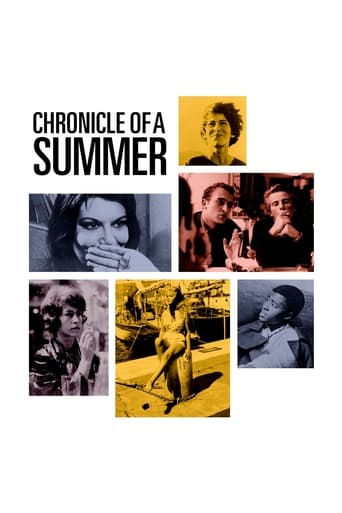Jackson Booth-Millard
This was a French documentary film listed in the book 1001 Movies You Must See Before You Die, apart from a few websites explaining what is it I couldn't find many reviews for it at all, I still watched it. Basically the film sees real life individuals discussing the topics of society and happiness in the working class, these testimonies are then recreated by the filmmakers with fictional moments based on their interviews. Later the individuals are seen discussing the images created with their own words and see if the movie recreated by actors obtained and captured their level of reality. To be honest, because of it being subtitled it was hard to concentrate on everything going on, and especially with which of the people seen on screen are supposed to be real or acting, and I wasn't concentrating fully on their discussions. But I suppose could see the point of the film, to see if real life can be recreated with enough realism to convince not only the audience watching, but the actual people watching themselves played by actors, I can only assume this is the reason for it, anyway it's not a bad documentary. Worth watching, at least once, in my opinion!
myxlastxsong
This film is incredibly poignant and essential in understanding the history of documentary film-making. Set in 1960's France during the Algerian War (France's equivalent of Vietnam), the viewer is taken on the journey of the lives of some incredibly interesting young adults. The film begins by reeling interviewees in with the simple question, "Are you happy?" Of course this is only a spring board for the subjects to invite us into their lives. Race relations, holocaust memories, mental illness, and so much more plague our subjects, both creating fear and excitement within the viewer. Not to mention there is a very cool, very unique ending, ala Robert Flaherty. Not to be missed.
Polaris_DiB
It has a somewhat simple beginning: Edgar Morin and Jean Rouch chose some characters and follow them around, organizing round-table discussions with them and trying to get a handle of their lives and how they are affected by living in 1960s Paris. The movie itself, however, becomes more complicated as it becomes a more experimental approach to the ever-present documentary conundrum: Truth. As Morin and Rouch play around with different ideas and approaches to making a Truthful picture of "a summer", they have to deal with problems of whether or not they're directing, how to truly show a person's character unchanged by a camera's presence, and all of those issues dealing with the burden of representation and what the subjects desire out of the process of being subjected to the camera's eye.However, there is no truth in media--there is only representation. Is this a problem? Morin and Rouch's documentary is itself a representation of discovering representation, which makes it infinitely self-reflexive and self-aware. Thus, it becomes problematic to truly decide whether or not the documentary is "successful" or not, especially since Morin and Rouch include an denouement where they discuss their impressions themselves. Does this documentary even need the subjects it represents in order to get it's own themes across, or do in fact the subjects deserve a more straight-forward exposition? These questions, not the answers, are the point of this documentary.--PolarisDiB
Fiona-39
This film, made in the summer of 1960 by the sociologist Edgar Morin and the ethnographer Jean Rouch, aimed to be as 'true as a documentary, but with the content of a fiction film.' Facilitated by improved technology (16mm film, sync sound, light hand held cameras) it pioneered a direct or live aesthetic dubbed 'cinema verite'. It was to film 'true life', but engage on a subjective level, getting people to talk about their experiences and ambitions, and most notably, whether or not they are happy. What emerges is an absolutely overwhelming cinematic experience, a film that is deeply affecting but also that makes you think. The film begins with a market researcher, Marceline, on the street, asking people whether or not they are happy. This sequence seems to me both to confirm the importance of human relationships and point up the dissatisfaction that living in a society about to tip into consumerism engenders. The film then moves to concentrate on a set of characters. Morin was criticised for his structural approach, typing his characters (i.e. a factory worker, a petit bourgeois, a student), but a real sense of the individuals involved shines through, notably in the sequences with Angelo and Landry chatting, and Marceline recounting her experience of deportation during the war. The most revolutionary part of this film is that the makers demonstrate the impossibility of documentary objectivity when they film themselves filming - they show how the truth of the film is constructed. Questions of authenticity abound. At the end of the film, they screen it to the characters involved. Even those filmed are unable to decide whether they were acting ('hamming for the camera') or being themselves. Morin and Rouch conclude they have failed in their aim to offer a slice of life, as the very act of filming something transforms it. Truth is elusive in the attempt to represent the everyday. This film is far from a failure however - watch it and be blown away.

